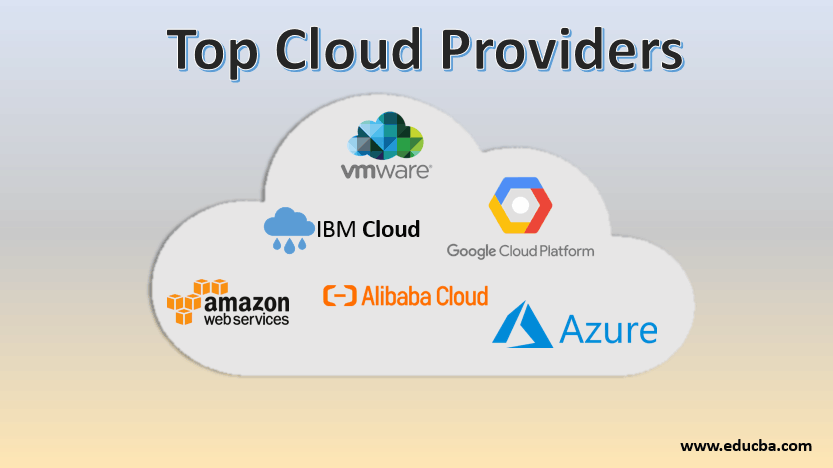Updated June 7, 2023
Introduction to Top Cloud Providers
Cloud computing being web-based computing allows business and individual to use computing resources; these services are frequently updated and offer services like IaaS, PaaS, and SaaS, which has used and pay facility, making them suitable for most organizations due to their heavy demand there are various cloud service providers like Microsoft Azure, Amazon Web Services, Google Cloud, Alibaba Cloud, IBM Cloud, Oracle, SAP, VM Ware, etc., which are competing neck to neck in the market.
Types of Cloud Providers
The following are the types of cloud providers:
1. Amazon Web Services
Amazon started providing web services in 2006. Amazon provides virtual machines of different configurations to users as per their requirements. Load balancing means balancing the servers with hardware or software, improving the application’s efficiency. Amazon provides elastic load balancing, which can grow or shrink according to customers’ needs. AWS offers standard, infrequent access and glacier storage services.
Benefits: PaaS services are available, or AWS is considered a public cloud provider offering IaaS. Amazon also provides a virtual private cloud for users. AWS provides mobile-friendly access- for both Android and iOS types. Users need not worry about the server in AWS; managing servers is done by the service provider itself. Storage and Database are two other features of AWS. Security is a major concern of AWS, which they manage efficiently. Also, users can buy software from the Amazon marketplace if needed.
2. Alibaba Cloud
Alibaba Cloud, also known as Aliyun, was started in 2009. Alibaba provides cloud services to online businesses and their systems. This is considered number one in China and globally third in the ranking. Alibaba provides standard, infrequent access and archive storage services. Prices are lower than AWS.
Benefits: Elastic computing is provided, like AWS. Storage and database services are available on Alibaba. Distributed servers are available on Alibaba. It provides data warehousing to the customers. It helps to manage the domain names and DNS through the network. Real-time management and monitoring of services are available. We provide security to safeguard servers from vulnerabilities.
3. Microsoft Azure
Started in 2010, Microsoft Azure is a public cloud service that provides IaaS, PaaS, and SaaS to users. Different services include computing, analytics, storage, and networking. There are different product types, such as web analytics, storage, and so on, to help customers choose from different products and to select according to their needs. You can use Azure for data backup and recovery purposes.
Benefits: Various benefits of Azure are Applications management, flexibility to use any functionality, agility, and compliance with regulations which make it easy to work, storage and updates, security provided by a spy movie environment, analytics support, and a unified delivery plan to provide end to end solution.
4. Google Cloud Platform
Google started its infrastructure-as-a-cloud in 2008, providing the same infrastructure. GCP provides IaaS, PaaS, and SaaS with its public cloud domain. GCP provides Google Compute Engine (GCE), Google Kubernetes Engine (formerly Container Engine) (GKE), Google App Engine (GAE), and Google Cloud Functions (GCF). User has the liberty of creating virtual machines and also can create Docker containers. GCP provides the platform, and users need not worry about underlying technologies.
Benefits: Users need not do server management. GCP automatically manages and scales the infrastructure involved. Users can take code from any application, and GCP provides the service. It supports code written in JavaScript, Python, and Goes language. GCP rapidly helps to move from concept to production by extending the codes.
5. IBM Cloud
IBM Cloud helps the user to develop and run modern apps and services. IBM started to experiment with virtualization in the 1960s. This is a public cloud working with PaaS and IaaS. The cloud helps users quickly access and launch the apps; iterations are carried out instantly and successfully. Organizations can choose between metal or virtual servers. IBM Cloud supports Python, PHP, Java, and Node.js, and supports many other programming languages.
Benefits: IBM Cloud provides public, private, and dedicated cloud services according to the customer’s needs. IBM Cloud helps in the integration of private and public cloud services. There is higher flexibility in this cloud between open technologies. IBM Cloud also helps in integration with hybrid clouds. This cloud provides access to data, analytics, and cognitive solutions. The main advantage is the usage of DevOps.
6. VMware Cloud
VMware Cloud is an integrated cloud with AWS to provide secure and innovative service to users. This was started in 2016. VMware Cloud is a public cloud providing both IaaS and PaaS. This combination enables the user to use VM tools and interfaces with the flexibility of AWS. Users need not know about AWS or have an account on AWS to use VMware Cloud.
Benefits: VMware Cloud provides integrated cloud infrastructure, which includes computing, storage, networking, and security. It has a standardized architecture. The company provides intrinsic security and automates lifecycle management. They give Kubernetes, which is ready to deploy.
Conclusion
Cloud computing helped us in many ways: data storage, spreadsheets, documents, image editing and video editing, presentations, maps, e-commerce, and many others. Since it is in online data servers, security is a major issue in cloud services. If we can manage that, cloud services will be a boon.
Recommended Articles
This is a guide to Top Cloud Providers. Here we discuss the introduction and different types of cloud providers with their benefits in detail. You can also go through our other related articles to learn more –




